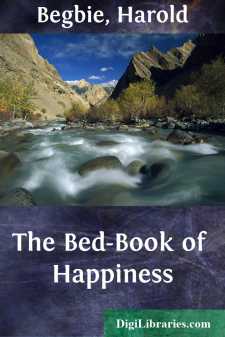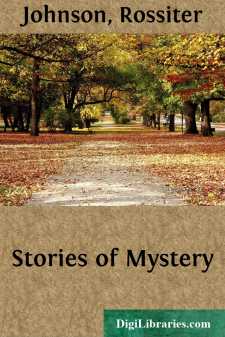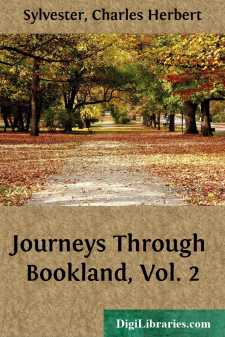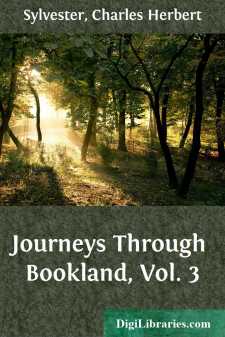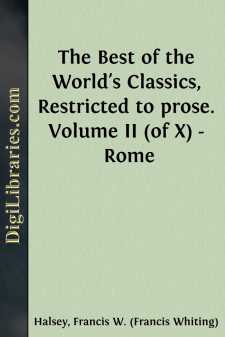Literary Collections
- American 84
- Ancient, Classical & Medieval 14
- Asian 1
- Australian & Oceanian 1
- Canadian 55
- Continental European 121
- English, Irish, Scottish, Welsh 179
- Essays 160
- General
- Letters 46
- Middle Eastern 1
General Books
Sort by:
by:
Harold Begbie
THE BED-BOOK OF HAPPINESS THEISSE[Sidenote: Richter] In his seventy-second year his face is a thanksgiving for his former life, and a love-letter to all mankind. RICHTER[Sidenote: Carlyle] We have heard that he was a man universally loved, as well as honoured … a friendly, true, and high-minded man; copious in speech, which was full of grave, genuine humour; contented with simple people and simple...
more...
by:
Rossiter Johnson
THE GHOST. BY WILLIAM D. O'CONNOR. t the West End of Boston is a quarter of some fifty streets, more or less, commonly known as Beacon Hill. It is a rich and respectable quarter, sacred to the abodes of Our First Citizens. The very houses have become sentient of its prevailing character of riches and respectability; and, when the twilight deepens on the place, or at high noon, if your vision is...
more...
by:
Emma Lazarus
One hesitates to lift the veil and throw the light upon a life so hidden and a personality so withdrawn as that of Emma Lazarus; but while her memory is fresh, and the echo of her songs still lingers in these pages, we feel it a duty to call up her presence once more, and to note the traits that made it remarkable and worthy to shine out clearly before the world. Of dramatic episode or climax in her...
more...
AESOP Many centuries ago, more than six hundred years before Christ was born, there lived in Greece a man by the name of Aesop. We do not know very much about him, and no one can tell exactly what he wrote, or even that he ever wrote anything. We know he was a slave and much wiser than his masters, but whether he was a fine, shapely man or a hunchback and a cripple we cannot be sure, for different...
more...
Last spring I found a pumpkin seed, And thought that I would goAnd plant it in a secret place, That no one else would know,And watch all summer long to see It grow, and grow, and grow,And maybe raise a pumpkin for A Jack-a-lantern show. I stuck a stick beside the seed, And thought that I should shoutOne morning when I stooped and saw The greenest little sprout!I used to carry water...
more...
BETTER THAN GOLD Better than grandeur, better than gold, Than rank and titles a thousand fold, Is a healthy body, a mind at ease, And simple pleasures' that always please. A heart that can feel for another's woe, And share his joys with a genial glow, With sympathies large enough to enfold All men as brothers, is better than gold. Better than gold is a conscience...
more...
Perhaps the reader may not feel in these papers that inner solidarity which the writer is conscious of; and it is in this doubt that the writer wishes to offer a word of explanation. He owns, as he must, that they have every appearance of a group of desultory sketches and essays, without palpable relation to one another, or superficial allegiance to any central motive. Yet he ventures to hope that the...
more...
CATO, THE CENSOR Born in Tusculum, Italy, in 234 b.c., died in 149; celebrated as statesman, general, and writer; questor under Scipio in 204; Consul in 195; served in Spain in 194; censor in 184; ambassador to Carthage in 150; one of the chief instigators of the third Punic war; among his writings are "De Re Rustica" and "Origines." OF WORK ON A ROMAN FARM When the owner of the farm...
more...
THE BEGINNINGS OF TRACTARIANISM During the first years of my residence at Oriel, tho proud of my college, I was not quite at home there. I was very much alone, and I used often to take my daily walk by myself. I recollect once meeting Dr. Copleston, then Provost, with one of the Fellows. He turned round, and with the kind courteousness which sat so well on him, made me a bow and said, Nunquam minus...
more...
RICHARD DE BURY Born in 1281, died in 1345; the son of Sir Richard Aungerville, his own name being taken from his birthplace, Bury St. Edmonds; educated at Oxford, and became a Benedictine monk; tutor to Edward III; dean of Wells Cathedral in 1333; bishop of Durham the same year; high chancellor of England in 1334; founded a library at Oxford; his "Philobiblon" first printed at Cologne in 1473....
more...


